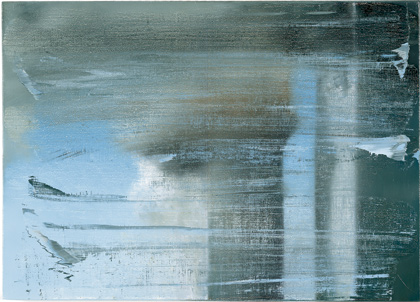This painting by Gerhard Richter is my favorite piece of 9/11-related art or literature; in fact, it might be the only piece of 9/11-related art or literature that I’ve ever actually liked:

I first came across it in The Atlantic about 2 years ago, and it resonates with my own changing perspective on September 11th as the years have passed. I was fortunate not to know anyone personally who perished in the World Trade Center towers, but (like millions of other people who lived in New York at the time) I was powerfully affected, perhaps traumatized in some small way, and I felt the effects for many months—indeed, on the first anniversary I felt compelled to write a short essay and email it out to some friends. It was one of the more mawkish things I’m ever likely to write, but apparently it touched a nerve, because the next thing I knew I got a request from a stranger in New Jersey asking if he could share it with his high school students in class. (How much easier that all would have been if I had had a blog back then!)
What a difference eight years makes. If you had asked me in late 2001, when the smell of smoke drifted up the Hudson to my apartment and soldiers with machine guns stood guard at my local subway station, or in late 2002, when I wrote that essay, I think I would have told you that the events of 9/11 had forever altered the way I viewed the world. I suppose that they did, strictly speaking, but I don’t think I would have predicted how quickly other events (wars, elections, tsunamis, droughts, recessions, whatever) would overtake 9/11 at the forefront of my consciousness, and how quickly memories of that period would fade. Sure, I still think about 9/11 sometimes, and occasionally I even feel a momentary twinge of panic when I hear a plane close overhead, but for the most part, the terrorist attacks of 2001 have settled in among a lot of other horrific geopolitical/historical events in my mind, with little special prominence except that they happened to occur in my city and my country (and that the tragedy of those lost lives was compounded by the tragedies of the wars that have followed).
For me, Richter’s painting of the iconic smoking towers captures that phenonemon well. A mere eight years after a period when I was almost obsessed by the events of 9/11 (or am I misremembering that too?), it now all feels like a fuzzy memory. The passage of time, and the failures of memory, have a way of distorting and obscuring the past so much that it is almost unrecognizable. It sounds odd, maybe even ghoulish, to suggest that I feel a kind of nostalgia for such a traumatic period when so many people were experiencing such intense grief, but when I look at the painting, it evokes a yearning to reverse the distortions of the image—that is, to reverse the very passage of time that has allowed most people to “move on” more quickly than anyone expected. A somewhat similar (albeit less tragic) feeling of loss hits me when I look at another piece of art showing a very different iconic image—Warhol’s large National Velvet, which hangs at SFMoMA. It shows the young Elizabeth Taylor, the very picture of beauty and vigor and innocence, literally fading before our eyes, as Warhol manically tries to stop time by furiously reproducing the image over and over and over. Or at least that’s how it always seems to me when I stand in front of it, and it is surprisingly poignant.
All this naturally makes me wonder which of my current feelings and convictions will dramatically alter with the passage of time. I generally approve of taking “the long view” when it comes to current events, because it’s far too easy to become consumed by the fleeting minutiae of the moment, but the danger of the long view is that if your view is too long, then it’s hard to really care about the present. As John Maynard Keynes pointed out in rebuttal to more laissez-faire economists who argued that the economy would work itself out fine on its own in the long run, “This long run is a misleading guide to current affairs. In the long run we are all dead.”
Who knows, maybe in the long run my feelings about the Richter and Warhol works will change too—I guess I’ll have to revisit them in eight years to see how I feel then.
10 Comments